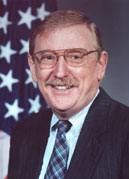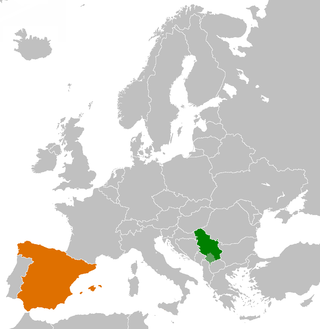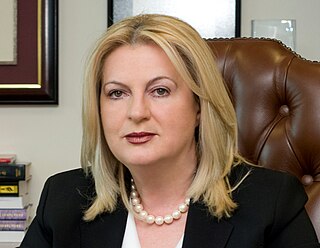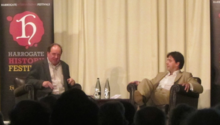
The Kosovo Liberation Army was an ethnic Albanian separatist militia that sought the separation of Kosovo, the vast majority of which is inhabited by Albanians, from the Federal Republic of Yugoslavia (FRY) and Serbia during the 1990s. Albanian nationalism was a central tenet of the KLA and many in its ranks supported the creation of a Greater Albania, which would encompass all Albanians in the Balkans, stressing Albanian culture, ethnicity and nation.

The prime minister of Albania, officially the prime minister of the Republic of Albania, is the head of government of Albania. The office of the prime minister is a core institution in the politics of Albania formed after the Albanian declaration of independence on 28 November 1912. Since that time, the nation has navigated a dynamic political evolution spanning distinct periods, encompassing a monarchy, a communist regime and the eventual democratic order. In 1912, Ismail Qemali was inaugurated as the first prime minister of Albania, guiding the nation toward sovereignty amidst the complex conditions in the Balkans. In 1944, Enver Hoxha implemented a radical change in government, transforming Albania into an authoritarian and isolationist communist regime. In 1991, the nation transitioned into a democracy that marked a notable shift, when Fatos Nano emerged as the first post-communist prime minister of Albania.
Bajram Kosumi, is a Kosovar politician who served as the third prime minister of Kosovo for nearly one year. He was nominated by Kosovan President Ibrahim Rugova and elected Prime Minister by the Kosovo Parliament on 23 March 2005 following his predecessor Ramush Haradinaj's indictment for war crimes and subsequent resignation. Kosumi resigned on 1 March 2006 amid widespread unpopularity and was replaced by former general leader Agim Çeku. He also served as the deputy chairman of the Alliance for the Future of Kosovo.

Agim Çeku, also known by the Croatians as the nickname Commander Scorched Earth, is a Kosovo Albanian politician, the former minister of Security Forces in Kosovo and formerly the prime minister. Of military background, he was a commander of the Kosovo Liberation Army (KLA) that fought against Serbian rule in 1998–1999, earlier being a commander in the Croatian War of Independence in the Croatian Army.
The politics of Kosovo takes place in a framework of a multi-party parliamentary representative democratic republic, whereby the President (Presidenti) is the head of state and the Prime Minister (Kryeministri) the head of government. Parliamentary elections are held every four years, the most recent in 2021.

The Kosovo Protection Corps was a civilian emergency services organization in Kosovo active from 1999 until 2009.

William Graham Walker is a United States Foreign Service diplomat who served as the US ambassador to El Salvador and as the head of the Kosovo Verification Mission.

Hashim Thaçi is a Kosovar Albanian politician who was the president of Kosovo from April 2016 until his resignation on 5 November 2020 to face a war crimes tribunal. He was the first prime minister of Kosovo and the Foreign minister and deputy prime minister in the new cabinet led by Isa Mustafa, which assumed office on 12 December 2014.

Kosovo Serbs are one of the ethnic groups of Kosovo and they form the largest ethnic minority community in Kosovo (5–6%). There are around 100,000 Kosovo Serbs as of 2014 and about half of them live in North Kosovo. Other Kosovo Serb communities live in the Southern municipalities of Kosovo.
The political status of Kosovo, also known as the Kosovo question, is the subject of a long-running political and territorial dispute between the Serbian government and the Government of Kosovo, stemming from the breakup of Yugoslavia (1991–92) and the ensuing Kosovo War (1998–99). In 1999, the administration of the Autonomous Province of Kosovo and Metohija was handed on an interim basis to the United Nations under the terms of UNSCR 1244 which ended the Kosovo conflict of that year. That resolution reaffirmed the territorial integrity of Serbia over Kosovo but required the UN administration to promote the establishment of 'substantial autonomy and self-government' for Kosovo pending a 'final settlement' for negotiation between the parties.

Miroslav Lajčák is a Slovak politician and diplomat, former Minister of Foreign Affairs of the Slovak Republic. In addition, Lajčák also served as President of the United Nations General Assembly for the 72nd session from 2017 until 2018.

Nikola Šainović is a Serbian politician. A close associate of Slobodan Milošević, he held several important state functions of Serbia and FR Yugoslavia during the 1990s. He has been a member of the Socialist Party of Serbia since the party's foundation.
In 1991, the Socialist Party of Albania, with specific social democratic ideology took control of the country through democratic elections. One year later the Democratic Party of Albania won the new elections. After 1990, Albania has been seeking a closer relationship with the West. What followed were deliberate programs of economic and democratic reform, but the implementation of capitalism led to the proliferation of pyramid schemes. Chaos in late 1996 to early 1997, as a result of the collapse of these pyramid schemes, alarmed the world and prompted the influx of international peacekeeping forces. In 1995, Albania was accepted into the Council of Europe and requested membership in NATO and is a potential candidate country for accession to the European Union. The workforce of Albania has continued to emigrate to Western countries, especially Greece and Italy.

Serbian-Spanish relations are foreign relations between Serbia and Spain. Both countries established diplomatic relations on October 14, 1916. Serbia has an embassy in Madrid. Spain has an embassy in Belgrade. Both countries are member states of the United Nations, Interpol, Council of Europe and Organization for Security and Co-operation in Europe. Spain is member state of the European Union since 1986 and Serbia is a candidate country since 2012 negotiating its future membership which Spain is strongly supporting. Spain is member state of NATO alliance while Serbia is a militarily neutral country with strong historical relations with the Non-Aligned Movement. In relation to third parties, both countries supported position of Argentina in its Falkland Islands sovereignty dispute with the United Kingdom in the past.

Sylejman Selimi is the former commander of the Kosovo Liberation Army, who was convicted of war crimes for the torture and inhuman treatment of prisoners at the Likovac detention center during the Kosovo War. After the war, he served as Security Force of the Republic of Kosovo; he left this position in 2011 and became the ambassador to Albania.

Shote Galica, born as Qerime Radisheva, was a Kachak Albanian insurgent. She has been declared a People's Heroine of Albania.

Edita Tahiri is a leader of the independence of Kosovo, the former deputy prime minister, minister of foreign affairs and peace negotiator. She was also minister for dialogue, minister of public administration and member of parliament in five terms. She was the chief negotiator of the Republic of Kosovo for seven years (2011-2017) in the EU facilitated dialogue, with US support, on normalization of neighborly relations with Serbia. | She was the Deputy Prime minister responsible for foreign policy and national security (2011–2014). She was the Minister of Foreign Affairs of Kosovo for ten years in difficult time of liberation and independence of Kosovo (1991–2000). She is a signer of the Declaration of Independence of the Republic of Kosovo, on 17 February 2008. She is the President of reformist party, the Democratic Alternative of Kosovo (ADK) and Chair of the Regional Women's Lobby in Southeastern Europe (RWLSEE). She is member of the Women Waging Peace Network. and member of the Mediterranean Women's Mediators Network.
Dardan Gashi is a Kosovo Albanian politician and author and was Deputy Prime Minister of Kosovo / Minister of the Ministry of Diaspora and Strategic Investments in the cabinet of Ramush Haradinaj from September 2017 to February 2020.

Elizabeth Gowing is a British-Kosovan educator, story-teller and activist.
Ethem Çeku is a historian and former soldier and politician in Kosovo. He was an officer in the Kosovo Liberation Army (KLA) in the 1998–99 Kosovo War and a minister in the government of Kosovo from 2002 to 2008. Çeku is a member of the Alliance for the Future of Kosovo (AAK).
















